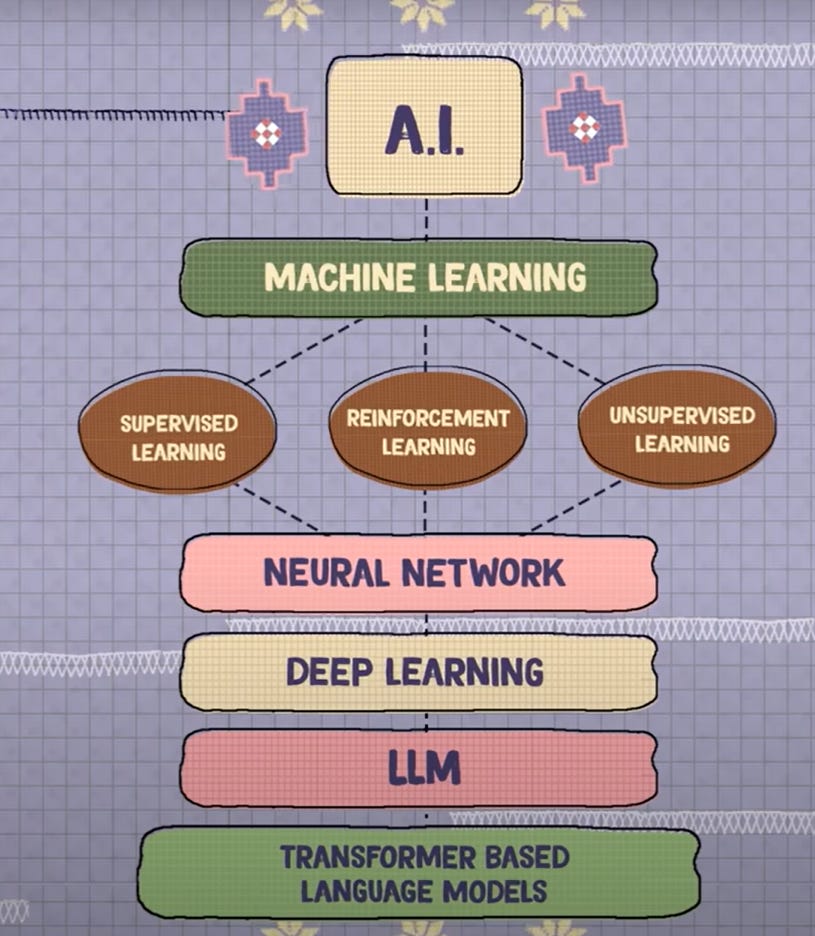Learning New Things #1: What is AI?
Learning from the podcast WTF is Artificial Intelligence Really? | Yann LeCun x Nikhil Kamath | People by WTF Ep #4
I recently went through the Podcast by Nikhil Kamath WTF with Yann Lecun; frankly, these 90 minutes were an absolute game-changer. The insights shared were thought-provoking and incredibly inspiring, making it a must-listen for anyone interested in AI and innovation. This is one thing that will profoundly impact humankind.
“The pace of progress in artificial intelligence (I’m not referring to narrow AI) is incredibly fast. Unless you have direct exposure to groups like Deepmind, you have no idea how fast—it is growing at a pace close to exponential. The risk of something seriously dangerous happening is in the five-year time frame. 10 years at most.”
—Elon Musk
A.I. is a convergence of various disciplines
Computer Science & Engineering: The backbone of AI, providing the algorithms, data structures, and programming languages necessary for developing intelligent systems.
Mathematics: Essential for understanding algorithms, probability, statistics, and optimization, which are fundamental in AI research and development.
Cognitive Science: Explores how the human mind works and applies that understanding to create more intuitive and human-like AI systems.
Neuroscience: Provides insights into how the brain processes information, influencing the development of neural networks and other AI models.
Linguistics: Critical for natural language processing (NLP) and understanding how to enable machines to interpret, process, and generate human language.
Psychology: Offers insights into human behavior and decision-making, helping to design AI systems that better interact with people.
and many more…
Key learning from this Podcast
The A.I. Tree
AI has been in the works since the 1950s and the level of output we see from these AI tools is not a sudden outcome but rather through sheer compounding of knowledge and convergence of various disciplines.LeCun's Elephant Analogy
You might be familiar with the story of the blind men and the elephant.
Each blind man touches a different part of the elephant and comes to a different conclusion about “what an elephant is?” based on their limited experience. Similarly, different branches of AI have focused on specific aspects of intelligence while ignoring others.
● 1950s: AI researchers primarily viewed intelligence as reasoning and problem-solving, particularly through search algorithms. This approach dominated until the 1990s, overlooking essential aspects like perception and abstract thinking.
● Another branch of AI, also originating in the 1950s, aimed to replicate the learning mechanisms observed in animals and humans. This approach focused on neural networks inspired by the brain's structure and learning processes. However, early neural networks had limited learning capabilities, leading to a decline in interest until the 1980s.
Why is this analogy relevant? Because progress in AI requires a comprehensive perspective and collaborative efforts to unlock the full potential of intelligent machines.
● There is a need to develop a holistic understanding of intelligence that considers all its facets, rather than focusing on isolated aspects.
● It is important to move beyond the limitations of current AI systems like Large Language Models (LLMs) by developing architectures capable of learning from the real world, possessing persistent memory, and engaging in hierarchical planning.
Other Insights from the podcast
"The mistakes we're making is because if we were a little smarter, if we had a better mental model of how the world works...I think we could solve our problems better, we would take decisions that are more rational."
Human Level Intelligence will take 5-10 years
Currently:
"The smartest LLMs are not as smart as your house cat."
However:
"The future is that if we succeed in this plan, which may succeed within the next five or ten years...we'll have systems that as time goes by, we can build up to become as intelligent as humans, perhaps."
Moving to Open Source
"The world is going to be dominated by open-source platforms...We're going to have open-source AI platforms in a few years. They'll probably be trained in a distributed fashion, so they're not going to be completely controlled by a single company.”
Proprietary AI engines will decline in importance as open-source platforms advance in performance. This shift would make it more advantageous for startups to fine-tune open-source engines for specific applications rather than relying on APIs.
Investment in Data Centers
Investing in data centers in India appears to be a promising opportunity, considering the future of AI and its growing significance in India.
Distributed Training and Inference
The future of AI involves training models in a distributed manner across the globe, requiring significant computing infrastructure locally. This distributed approach ensures AI systems are trained on diverse data, representing a wide array of languages, cultures, and values.
*****
Gratitude to Nikhil Kamath for bringing out such an amazing content 🙏
and Yann LeCun for explaining enthusiastically 🙂Invest in yourself…. be a learning machine.
These communities have helped me learn the nuances of investing. Why not check them out? - Join the community of learners.
Free Course by Vivek Mashrani (TechnoFunda Investing)
What I plan to read on AI
A Brief History of Intelligence: Why The Evolution of The Brain Holds The Key To The Future of AI
Genesis: Artificial Intelligence, Hope, and the Human Spirit
Supporting my work
This Substack will never be paywalled. I don’t want to accept voluntary payments for future unknown work.
But if you got this far, chances are you find my writing valuable. So please spread the word! Sharing, liking, and commenting all help spread the word!
Connect on X @pankajgarg_ciet
Disclaimer: I am not SEBI registered. The information provided here is for educational purposes only. This is not a buy or sell advice. I will not be responsible for any of your profit/loss based on the above information. Consult your financial advisor before making any decisions.
Thanks for reading Learning Lifelong! Subscribe for free to receive new posts and support my work.





Good